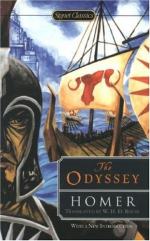But poverty soon drove him to Cumae. Having passed over the Hermaean plain, he arrived at Neon Teichos, the New Wall, a colony of Cumae. Here his misfortunes and poetical talent gained him the friendship of one Tychias, an armourer. “And up to my time,” continues the author, “the inhabitants showed the place where he used to sit when giving a recitation of his verses; and they greatly honoured the spot. Here also a poplar grew, which they said had sprung up ever since Melesigenes arrived.”
But poverty still drove him on, and he went by way of Larissa, as being the most convenient road. Here, the Cumans say, he composed an epitaph on Gordius, king of Phrygia, which has however, and with greater probability, been attributed to Cleobulus of Lindus.
Arrived at Cumae, he frequented the conversaziones of the old men, and delighted all by the charms of his poetry. Encouraged by this favourable reception, he declared that, if they would allow him a public maintenance, he would render their city most gloriously renowned. They avowed their willingness to support him in the measure he proposed, and procured him an audience in the council. Having made the speech, with the purport of which our author has forgotten to acquaint us, he retired, and left them to debate respecting the answer to be given to his proposal.
The greater part of the assembly seemed favourable to the poet’s demand, but one man “observed that if they were to feed Homers, they would be encumbered with a multitude of useless people.” “From this circumstance,” says the writer, “Melesigenes acquired the name of Homer, for the Cumans call blind men Homers.” With a love of economy, which shows how similar the world has always been in its treatment of literary men, the pension was denied, and the poet vented his disappointment in a wish that Cumae might never produce a poet capable of giving it renown and glory.
At Phocaea Homer was destined to experience another literary distress. One Thestorides, who aimed at the reputation of poetical genius, kept Homer in his own house, and allowed him a pittance, on condition of the verses of the poet passing in his name. Having collected sufficient poetry to be profitable, Thestorides, like some would-be literary publishers, neglected the man whose brains he had sucked, and left him. At his departure, Homer is said to have observed: “O Thestorides, of the many things hidden from the knowledge of man, nothing is more unintelligible than the human heart.”
Homer continued his career of difficulty and distress, until some Chian merchants, struck by the similarity of the verses they heard him recite, acquainted him with the fact that Thestorides was pursuing a profitable livelihood by the recital of the very same poems. This at once determined him to set out for Chios. No vessel happened then to be setting sail thither, but he found one ready to start for Erythrae, a town of Ionia, which faces that island, and he prevailed upon the seamen to allow him to accompany them. Having embarked, he invoked a favourable wind, and prayed that he might be able to expose the imposture of Thestorides, who, by his breach of hospitality, had drawn down the wrath of Jove the Hospitable.




